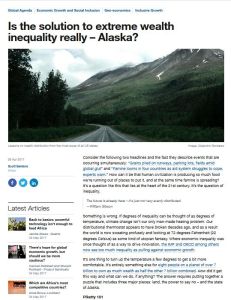Join getAbstract to access the summary!

Join getAbstract to access the summary!
Scott Santens
Is the Solution to Extreme Wealth Inequality Really – Alaska?
World Economic Forum, 2017
What's inside?
Paying people to use the Internet may not be a farfetched way to shrink the wealth gap.
Recommendation
When the world’s eight richest people hold the same amount of wealth as half of the remaining seven billion, it is clear that extreme income inequality is a fact of life. Economists and experts all have their ideas on how to narrow the wealth gap, but as writer Scott Santens notes in this enlightening article, the US state of Alaska may be on to something. Its Permanent Fund Dividend allows all Alaskans to reap the financial benefits of the state’s natural resources. And therein perhaps lies the seed of new ways to tackle wealth inequality. getAbstract recommends this intriguing report to politicians, economists and anyone looking for inequality solutions.
Summary
About the Author
Scott Santens is a writer, blogger and advocate for a universal basic income.


















Comment on this summary